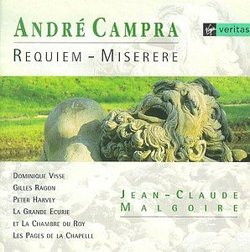| All Artists: Andre Campra, Jean-Claude Malgoire, Gilles Ragon, Dominique Visse, Peter Harvey, La Grande Écurie et la Chambre du Roy Title: Campra - Requiem ~ Miserere / Visse, Ragon, Harvey; Malgoire Members Wishing: 0 Total Copies: 0 Label: EMI Import Release Date: 4/6/1999 Album Type: Import Genre: Classical Styles: Opera & Classical Vocal, Historical Periods, Baroque (c.1600-1750), Early Music Number of Discs: 1 SwapaCD Credits: 1 UPC: 724356152823 |
Search - Andre Campra, Jean-Claude Malgoire, Gilles Ragon :: Campra - Requiem ~ Miserere / Visse, Ragon, Harvey; Malgoire
 | Andre Campra, Jean-Claude Malgoire, Gilles Ragon Campra - Requiem ~ Miserere / Visse, Ragon, Harvey; Malgoire Genre: Classical
|
Larger Image |
CD Details |
CD ReviewsExcellent sound, dominant boy trebles Leslie Richford | Selsingen, Lower Saxony | 10/18/2004 (4 out of 5 stars) "Excellent stereo sound is the hallmark of this CD that my CD-player instantly recognised as HDCD-encoded although there are no indications of this in the booklet. André Campra (1660 - 1744) is probably better known for his stage works, written during the fruitful middle period of his life, but he was also a gifted composer of sacred music, especially in his youth and in his latter years, and Jean-Claude Malgoire has here recorded his superb Requiem together with a motet on Psalm 50 (51), the 'Miserere'. The Requiem demands, according to the booklet, four soloists: haut-contre, taille, basse-taille and bass; the recording itself, however, only has three soloists: Dominique Visse, whose androgynous high tenor to me seems more suitable for the comic opera than for serious church music, tenor Gilles Ragon and an excellent Peter Harvey, baritone. The choral forces used here are most unusual: Two female first sopranos, one female second soprano, four male hautes-contre, five tailles (tenors) and four basses plus no less than 15 boy trebles who by sheer weight of numbers tend to dominate the scene. The orchestra (13 violins, 4 violas, 3 cellos, 2 double basses, two each of flute, oboe and bassoon, an organ and a theorbo) has a mainly supportive role and there are practically no purely instrumental passages. In the Miserere there are some treble solo passages ('Asperges me hyssopo'), and while some listeners will enjoy the angelic clarity of the children's voices, the old problem of young children's lack of musical maturity does raise its head (this is why Philippe Herreweghe, for example, uses female sopranos, even when historical authenticity would demand boy trebles). Each of the 17 tracks of the CD has its special highlights, and the whole is most entertaining listening, even if an occasional doubt might cross one's mind as to whether Malgoire has not possibly exalted individual trees at the expense of the whole wood."
|

 Track Listings (17) - Disc #1
Track Listings (17) - Disc #1